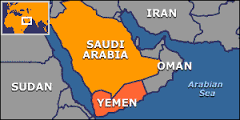
The Saudi-led military intervention in Yemen threatens to turn what has been a civil war between competing branches of Islam into a wider regional struggle involving Iran. It could also destroy any hope of stability in Yemen. Even before the Saudis and their Arab allies started the bombing, Yemen was in severe distress; on Tuesday, the United Nations high commissioner for human rights warned that it is now on the brink of collapse.
Rather than bombing, Saudi Arabia should be using its power and influence to begin diplomatic negotiations, which offer the best hope of a durable solution. Saudi Arabia intervened last week after the Houthis, who are supported by Iran, overthrew Yemen’s Saudi-backed government and captured large chunks of land. The Sunni-run government in Saudi Arabia has watched with growing alarm as Shiite-majority Iran has gradually extended its influence throughout the region, from Lebanon to Syria and Iraq, and fears Iran is poised to do the same in Yemen, a Sunni-majority nation.
The possibility of a deal between the United States, other major powers and Iran to limit Iran’s nuclear program has alarmed Saudi Arabia and other Sunni states even more, prompting them to talk openly, and irresponsibly, about developing their own nuclear programs. The Saudis have also joined with other Sunni nations to form a military coalition, anticipated to include a 40,000-troop army, to counter Islamic extremists and Iran, which is likely to further increase tensions.
Saudi Arabia and other Sunni Arab states have reason to worry about Iran’s disruptive, sometimes brutal, policies, including its help in keeping President Bashar al-Assad in power in Syria despite a civil war that has killed more than 200,000 people, most of them Sunnis. Even so, the Arab states have their own checkered history in fueling extremists and regional unrest. The Saudis appear to be overreacting to Iran’s role in Yemen, which involves financing the Houthis but little else, according to American officials.
Yemen has been a problem for decades, and the threat there is growing more complicated. For several years, Al Qaeda in the Arabian Peninsula has been based in Yemen and is one of Al Qaeda’s most active and lethal affiliates.
Unlike that Qaeda affiliate, the Houthis are indigenous to Yemen and won’t be defeated militarily, or at least not without destroying the country. The Saudi foreign minister, Prince Saud al-Faisal, on Tuesday foreshadowed an open-ended commitment, saying the Saudi-led offensive would continue until Yemen was “returned to security, stability and unity.” Yet airstrikes alone won’t do the job. Saudi Arabia has not ruled out a ground invasion, even though its troops are inexperienced in such combat and would be at a particular disadvantage against Houthi fighters, who are battle-hardened and know the country’s forbidding terrain.
The Houthis have fought a half-dozen civil conflicts since 2004 and are still standing. The Saudi bombing may have already had one especially tragic outcome: Humanitarian workers said a strike killed at least 40 people at a camp for displaced people.
It would be a catastrophic mistake for Saudi Arabia and other Arab states to allow the Yemeni civil war to become the catalyst for a larger sectarian Shiite-Sunni war with Iran. President Obama should press this fact upon the Saudi leadership. As one of Saudi Arabia’s most reliable allies, he should use his influence to encourage all sides to work toward a political solution — both to prevent a wider conflict and to give Yemen a chance at stability
